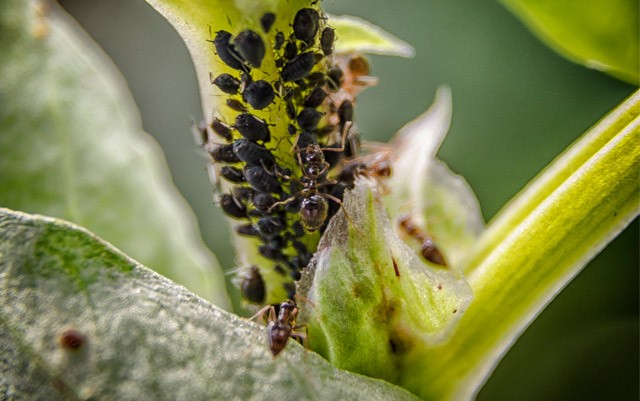Despite strict quarantine of incoming materials, use of sterile growing media, plus HEPA filtered air, Aphids can happen indoors. Out in the field these pests are especially ubiquitous. Aphids come in a rainbow of colors and there are many varieties adapted to particular plants. ( http://www.ipm.ucanr.edu/PMG/PESTNOTES/pn7404.html ) The most common source of trouble for Cannabis will be the soft gray types often seen on cole crops, the soft green bugs that infest tomatoes, and the harder bodied black Aphids which favor legumes.
Aphids on Cannabis behave almost like Ticks or Mosquitoes on human flesh, plunging a hypodermic needle like mouth organ into the leaves or stems of your grow to bloat their soft bellies with a liquid feast of the plant’s vital fluids. Because there is so little protein in the vascular system of plants, these tiny pear-shaped pests must gorge themselves, pooping out a steady drip of sugary excrement called “HoneyDew”.
These destructive critters are so soft and weak that they can be dislodged, even killed, with a sharp jet of water, simply hose ’em off for the most organic method of eradication. Severely infested, curled, withered leaves and growing tips are a lost cause and should be pruned away. Insecticidal soaps such as Safer or your own home brew mixtures can kill Aphids, but my experience is that you will need to be vigilant about regular application. Horticultural oils can kill Aphids by smothering the bugs if you can penetrate all their hiding spots under leaves and in the growing tips during the vegetative growth period. Avoid oil sprays once you’ve transitioned to the flowering cycle.
In nature, a variety of natural predators such as lacewings and lady bugs keep Aphids in check. It’s a common organic do-gooder mistake to plunk down a few bucks for a package claiming to contain hundreds or even thousands of Lady Bugs at Home Depot or on Amazon. The sad truth is those containers only yield a few dozen bugs. Should you actually count them and then complain back to the company they will tell you that what they really meant is that since the Lady Bugs are shipped mature, they will soon lay eggs and produce another generation of larvae which in theory could possibly result in hundreds or thousands of bugs, but really, that’s kind of a scam. Why can’t they be honest about the shipping count? Because you might not like the cost per bug if they told the truth about how many they are actually selling to you. They’ll fly away home anyway in a day or two to benefit your neighborhood, just not necessarily your garden.
Double-trouble ! Not only can Aphids multiply rapidly to cover the underside of leaves or hide in the tender growing tips and bud colas to literally suck the life out of your plants; the concentrated sugary honeydew they poop out is a perfect growing medium for a black sooty fungus. In what may sound like a story from a Frank Zappa song there is one additional bit of natural weirdness to worry about; seems that some varieties of Ants consider Aphid poop to be nature’s perfect food.
Like cowboys tending herds, Ants will carry their domesticated Aphids up on to plants and protect them like wild west ranch hands. In my garden there are several types of ants, most seem to do no harm to crops, but the big black ones are always trying to establish colonies of Aphids on succulent veggies or Scale on fruit trees and vines. I know of no effective “organic” way to eradicate the Ants. I just try to “train” the hive mind to work elsewhere by discouraging them whenever possible by eradicating the Aphids. On big sun-grown Sativas you can exclude Ants, and in turn their Aphid slaves, by wrapping the trunk with some brown paper and coating it with TangleFoot just like you would a fruit tree.
Aphids Suck Image by Bruce N. Goren
Disclaimer: Any advice and opinions offered about the cultivation of cannabis by Bruce N. Goren are his own and do not represent the University of California or the Master Gardener Program.






